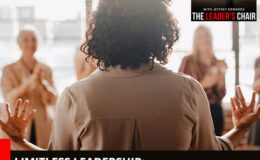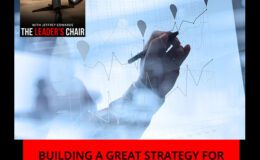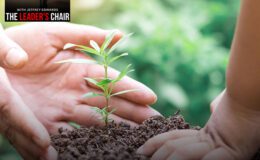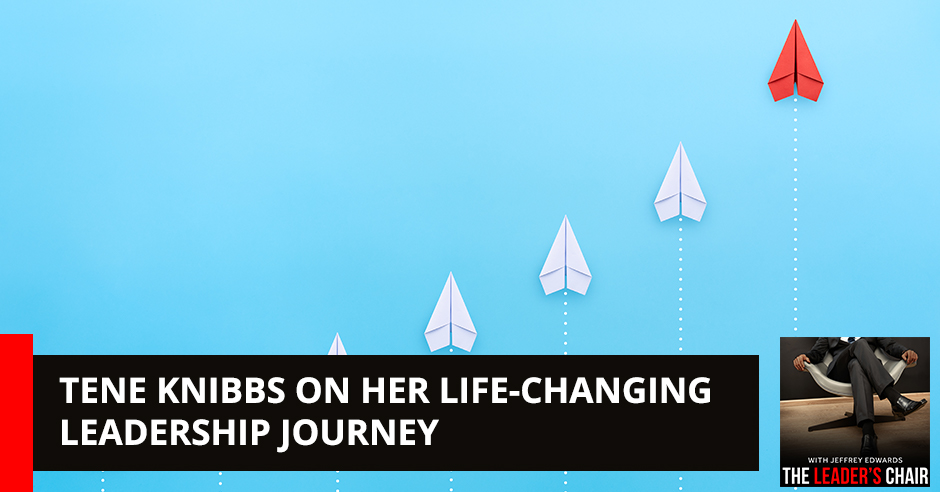
Tene Knibbs knows that leaders are nothing without a team that trusts them. In this episode, Tene reminisces about her time in Chile as a young, Black woman, who learned how to lead by connecting with the people around her.
Tene explains why every leader must know how to be flexible, adapt to cultural differences, and embrace their passion to meet the call of leadership.
About Tene Knibbs
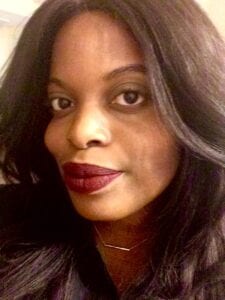 International Specialist and Business Consultant with Deloitte, Tene Knibbs has led large transformation projects for clients in countries such as the US, Chile, Uganda, and even in her home country of Canada.
International Specialist and Business Consultant with Deloitte, Tene Knibbs has led large transformation projects for clients in countries such as the US, Chile, Uganda, and even in her home country of Canada.
Tene is also a mentor, coaching leaders at all levels, helping them realize their true potential.
Check out this episode if you want to learn:
- What it takes to expertly handle difficult situations in business
- How building personal relationships with clients can help you progress
- Why authenticity is key to effective leadership
🎧 Listen to the podcast here:
Tene Knibbs On Her Life-Changing Leadership Journey
You’re an international business consultant. Where did this all start for you?
(In) high school, I always had this curiosity about different languages, different people, (and) where they come from. I remember in my Advanced Geography classes, I (told my teacher), ‘Do you know what I want to be when I grow up? An international business consultant.’
I had no idea what consulting was, didn’t know about Deloitte, the Big Four or anything. All I knew was I want to travel the world, to experience new cultures — but I also wanted to help organizations solve their problems.
It wasn’t a straight path to where I am, (and) I’m grateful that the road led me to where I am now, and that proclamation in geography class in Grade 10 came true.
You’ve covered continents with the work that you’ve done. What’s your speciality?
I am an accountant by profession, and (started) out my career working within finance (in) the federal government.
As I transitioned to consulting, that’s where I started looking at business problems from my CFO or finance lane. The lane that I’ve grown into is solving business problems for clients, particularly in the public sector, thinking about things (like): how do you take advantage of automation?

Leadership Journey: Providing an outsider perspective helps break down walls, allowing vulnerability to come out.
How do clients think about where they are today, where they want to be tomorrow, and bridge that gap? That’s how I boil it down. I might do that in finance, but it’s more around the big thinking, learning from the past, and strategizing how you get (to the future).
What are some of the common issues you see when you enter into these organizations?
The client will call us for a certain problem that they think they have. As we start to understand and unpack that with them, what they have described to us are symptoms of an underlying issue. Understanding what is it that you’re trying to solve for is the number one piece.
Where to go next is it’s not so much (a) technical issue (as it is) people dynamics. Whether you’re planning a system, putting in robotic process automation or whatever it is, the biggest challenge that I help my clients work through is: how do people get aligned, (and) how do leaders bring their team along?
How do you help leaders change the way they approach a situation?
One of the key things is to make sure that you understand where that stakeholder is coming from. What are they going to get out of the transformation? There’s a little bit of a scare factor sometimes, where you want to impress upon the risk of not changing, because there is a cost (associated) to that.
The benefit of being a third party (consultant is that) you can be a good sounding board, a mirror to hold up to the organization to say, ‘This is all that you told me, let me play that back to you’. Providing that outsider perspective also helps to break down the walls, (for) vulnerability to come out.
As we start to understand what is causing resistance, (we) start to be able to see people as humans, and (are) able to speak in the way that (allows them) to hear it, and bring them along that journey.
'It's not so much of the technical issues that are the challenge. It's the people dynamics.' Share on XWhat are some of the ways in which you’ve helped people through those moments of vulnerability?
One thing that I’ve learned over my time with Deloitte management consulting is how important connecting with people is. I try to get to know who I’m working with on a more personal level. Beyond the project or the immediate task at hand, what is keeping them up at night? How can we support beyond the bounds of this immediate project?
When you start to relate to people on that level, they start to be responsive, and understand that you’re there to support them.
Having that empathy for what they’re going through, and being present.
It’s even further highlighted with this pandemic that we’re going through. Those lines between home and work are completely blurred. I’m sitting here at my kitchen isle. This is where I live, relax, have lunch — or do a podcast!
Everything is happening all at once, (and) people are even relating to that. We get on calls and say, ‘Both of your kids are in the background. What are their names?’ It’s connecting on a personal level, because we’re all experiencing life and work all at once.
You moved to Chile for a project; what inspired you to go?
I’m Canadian-born with parents from Jamaica, (and) I had never experienced life outside of Canada at that point in time. It was a big culture shock, but I rose to the occasion because I wanted that particular experience of diving into something that I didn’t know from a cultural perspective, language perspective, personal life perspective, professional life perspective. Everything was different. I was craving some change, and that was the one that worked for me.

Leadership Journey: Leaders must let other cultures envelop themselves and put their own flavor on things, while still having a certain level of cultural intelligence.
What was the experience like for you, leading people as a young woman coming from a different country and cultural background?
It was scary. I was nervous and apprehensive, (with) a false sense of security. I had been at my firm for a couple of years, (and) was a manager when I went down to Chile. The first meeting with clients and colleagues, I did not understand one thing. The only thing I understood at the end of the meeting was, ‘Tonight we are going to do X.’
How did it feel? It was humbling. I had to take off that veneer of, ‘I came here to get this accomplished.’ I had to slow down, learn how to ask for help in every dimension. I also had to bring confidence that, while I might not know the language well, I do bring a lot of different skills, knowledge and experiences.
It helped that the Chilean culture is warm and welcoming. They were willing and curious about me, asking me questions, and bringing me home for dinner with their families. It was a challenge, but it was (made) easier by those that I was surrounded by.
I can imagine that the learning curve was sharp, but at the same time, projects didn’t just pause. How long did it take you to feel settled in?
It is a cycle: you get there, and you’re excited. Then after a couple of months, reality sinks like, ‘This is my life and this is where I am. The people in my close-knit circle aren’t here, (and) I’m learning a new language.’
It was probably six months (in), we won a big project (to) review a number of processes for one of the government ministries. I had to travel around Chile doing workshops and data gathering with different organizations as part of the work. That’s when I had a moment in one of our trips saying, ‘I’m enjoying this.’
I got in a plane, went to another city, led a workshop with people in rural areas, speaking real Chilean Spanish. That’s when I thought, ‘I’m making it work.’
'Leaders need to see it from the eyes of their team and let them understand what's in it for them.' Share on XHow long were you down in Chile?
I went down for a two-year assignment (but) I ended up staying for the third year (because) I was having so much fun.
What were your takeaways from the experience?
The personal takeaway is how resilient and adaptable I am. I also (learned) how people’s relationships are integral to your experience. If I think about my circle of friends, I had a lot of friends from Chile who were local, but I also had a good network of friends who were ex-pats, experiencing the same thing as me.
(Also), I learned about how to be respectful of cultural differences. I could have left quickly if I thought the North American way is the best way, and tried to impose that. It’s (about) letting the culture envelop you, and (putting) your own flavour on things while still having cultural intelligence.
You’e a woman, a person of colour, and you’re young. Any one of those can be seen as a barrier to acceptance, recognition and respect. What’s been your experience in being accepted as a leader?
That’s such a question that’s been highlighted over the events of 2020, especially around the increased focus and attention being brought to anti-Black racism. These are the discussions that I’ve been having from a gender and race perspective.
My experience has been interesting, because I feel on the one hand that I’ve accomplished a lot. I’ve been able to get roles and experiences along with my peers and even maybe in other groups. I’ve also had this experience of feeling like I had to assimilate (in) some ways, as opposed to embracing all the things that make me. That includes being Black, a woman, an introvert — all these labels that we attach to ourselves.

Leadership Journey: People’s relationships are integral to any leadership experience.
It’s been such an interesting journey. You feel good, you accomplish things, work alongside different people, but that feeling of otherness (comes) up in certain respects.
I remember (being) in a meeting with a group of leaders (who) were waiting for the meeting to start. One leader asked me, ‘I’ve talked to you a couple of times but I don’t know much about you. Where are you from?’ I’m like, ‘I was born in Canada, I’m Canadian.’ (Then) he’s like, ‘Where are you really from?’ It started to become awkward because I knew the question was, ‘You’re Black. You need to be from somewhere else.’
At that moment, what I felt was, ‘I’ve been working here for years. I work alongside these people every day, but still I’m seen as that Black person that’s different.’ Not that I think it’s a bad thing for us to see people for their uniqueness, (but) sometimes the biases, we wonder — how does that come into decision-making? How does it come into who gets leadership roles? Who gets paid? How much do they get?
It starts to put that doubt in your mind — if that person can see me that way, did that come up when I didn’t get that job or that raise?
You coach and mentor leaders at all levels. What are some of the experiences where you’ve been called in to be a coach or a mentor to either colleagues, or even clients?
As part of my work, I find myself to be fortunate to be in a position where I lead teams. I do find myself in an informal mentoring and coaching role, whether I’m helping the team members to think about how to approach (a) particular topic, (or) thinking about (their) career journey.
Sometimes with our clients, we get to know each other on a more personal level. We start to get calls (like), ‘We’re trying to do this in our organization, but I’m not sure how to navigate the situation internally.’
I have opportunities to be that third-party, listening ear — the person that can ask questions and help our people work through challenges.
With everything that you’ve accomplished, how would you describe yourself from a leadership perspective?
To me, I’m most proud (of my leadership) when (I) found my true, authentic voice. I started to be more myself, recognizing where my strength areas are — not only what I’m good at, but what energizes me and what I’m passionate about. Focusing and harnessing those pieces, (I) stopped worrying about things that (weren’t) in my wheelhouse. That’s OK, because I work in a team, and other people can provide that support.
When I became more aware of my own voice and my own authentic style is when I became the leader that I’m proud of.
'Don't focus on the things that you're not. Focus on the things that you are.' Share on XPart of that is around my connection with people. I love having good conversations, asking questions, challenging, laughing. That’s probably my number one thing that I love to do: have a good time and enjoy humour. Connecting on that authentic level of who I am, and letting that person shine.
Finding that piece that makes you you — that’s where leaders shine the best.
Letting others shine, that to me is a sign of a good leader. I don’t need to be in charge of everything — I want to facilitate others to be able to do those things, as well. It’s (about) making sure that I am bringing others along, that I’m supporting the team.
How does it feel to know that there are people looking up to you for guidance?
It surprises me sometimes. It’s an honour and a privilege (that people) find something in me that they want to connect to. I find that’s a big responsibility as well, (which makes me) think about, what example am I setting? Also, (with) my other peer leaders — what are we portraying as a team, as a cohort of leaders?
What would you say to an emerging leader who’s facing an obstacle right now?
Don’t be afraid to ask for what you want. It’s important to have that confidence to say, ‘I’m here today, and tomorrow I want to be there.’ I spent a lot of time doubting myself. What I would say to those that might be experiencing the same thoughts is: focus on you, your strengths, what makes you happy and gives you purpose. Don’t focus on the things that you’re not — focus on the things that you are. That’s important.

Leadership Journey: A good leader doesn’t need to know or be in charge of everything.
You’re also an example to other women and women of colour.
I didn’t always have those people to look up to, (who) looked like me (or who) walked the path that me or my parents did. I look at my circle, my friends and you, (and) we’re doing it. There are much more of those role models in our communities. To be seen as one of them makes me proud. I’m happy to see more pictures of diversity, and making it possible for others. That’s special.
Where do you see yourself five years from now?
I’m now our National Co-Leader at Deloitte for the Canadian Black Professional Network. I’m passionate about making sure that we have opportunities for Black professionals that are equivalent to our peers in other groups. The fact that that’s part of my work and what I do every day — it gives me such a sense of purpose, and I’m no longer separating my personal and professional interests.
I hope that continues in the future, that I’m able to put my professional expertise to work in areas that are critical to our community development.
📌 Important Links:
Love the show? Subscribe, rate, review, and share!
Join The Leader’s Chair Community today on Facebook and Twitter.

